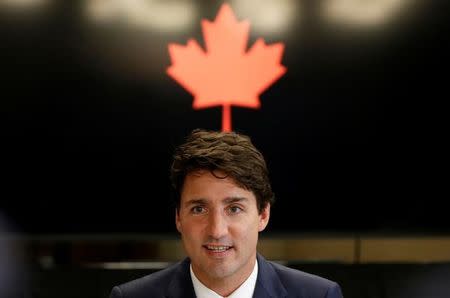Canada's Trudeau backs away from electoral reform promise

OTTAWA (Reuters) - Prime Minister Justin Trudeau on Wednesday indicated he was backing away from his pledge to reform Canada's electoral system after political opponents accused him of trying to rig it to benefit his ruling Liberal Party. Trudeau took power last November vowing to scrap Canada's first-past-the-post system, which allows a party to win a majority government with less than 40 percent of the popular vote. He initially promised new rules would be in place for the next election, scheduled for October 2019. But in an interview with the French-language Le Devoir newspaper, he made clear the timetable was likely to slip. "If we're going to change the electoral system, people have to be open to that," Trudeau said, adding that major changes would need the substantial backing of Canadians. "If we get less support, it might be acceptable to make a small change," he added in his first comments on the matter. Liberals had privately been signaling a delay was likely, given that public consultations are dragging and Canada's chief electoral officer says time is running out to introduce reforms before the October 2019 vote. Liberals prefer a preferential ranked ballot system, where voters indicate their first, second and third choices. If no candidate initially captures 50 percent of the vote, then second and third choices are counted until a winner emerges. The official opposition Conservatives - who complain this would unfairly benefit the Liberals - are demanding a referendum before a new system is brought in. The left-leaning New Democrats, who also suspect Trudeau wants to game the system, prefer proportional representation. Under first-past-the-post a country is divided into parliamentary districts and the candidate who receives the most votes wins. Votes for losing candidates have no weight. Many nations rely on proportional representation, which can lead to multi-party coalition governments. (Reporting by David Ljunggren; editing by Grant McCool)

